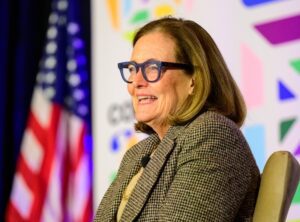Who is a member?
Our members are the local governments of Massachusetts and their elected and appointed leadership.

Health and Human Service Secretary Kate Walsh discusses her experiences as a former hospital executive and her current role overseeing the state’s health agencies during the Women Elected Municipal Officials Leadership Luncheon on Jan. 24 in Boston. She was interviewed by Ashland Select Board Chair Yolanda Greaves.
Health and Human Services Secretary Kate Walsh reflected on her years in health care and the importance of local and regional collaboration in the public health space during the Women Elected Municipal Officials Leadership Luncheon on Jan. 24.
Walsh sat for an interview with Ashland Select Board Member Yolanda Greaves (who was then WEMO vice chair) during Connect 351 in Boston, and began by reflecting on gender-related challenges she encountered earlier in her career.
Walsh recalled being in a meeting when the person running it requested that everyone talk again before the end of the day, but asked her — and none of the men in the room — if she could meet after 5 p.m.
“I think that’s beginning to change,” Walsh said. “Men are saying, I have family responsibilities, women are saying, I have job responsibilities, and we’re working it out.”
Walsh noted, however, that society still needs to spend more time considering the role that women, in particular, play as caregivers of elderly family members, especially in a state with a graying population.
When Greaves asked about her experience in an increasingly hostile and uncivil political climate, Walsh said one of the hardest parts of her job as secretary is understanding. When one works in a hospital, she said, people believe you are there to do the right thing. But in government, people seem to be looking for you to have done something wrong, which she said was shocking to her. She also noted “just a stunning lack of curiosity” by the public.
“If you make a decision in your role, very few people ask you why,” she said. “They just tell you what they don’t like about it.”
When faced with contentious situations, Walsh said, it’s important to have situational awareness. She’ll try to avoid getting hooked into an argument by simply stating her point of view and remaining calm — even though it can be difficult.
She told the audience of more than 300 local leaders: “You all have that added challenge of, you’re in the grocery store, you’re at church or you’re in a synagogue, or you’re — God help you — trying to go to the gym,” Walsh said. “You’re in your sweats, and somebody has a very important thing that they need to tell you about something that you may or may not even be responsible for. Like, there’s no place to hide.”
Walsh said it has gotten easier over the course of her career to move forward from those uncomfortable moments, but developing strategies for dealing with job stressors is different for public officials in part because there is not enough time to settle into the role before they happen.
“Your tenures are short, and before you get into office, you’re running again, or the person who appointed you is running again. It’s hard to build the muscles and nerves and synapses that help you respond and take care of yourself during that.”
At Boston Medical Center, where she served for 13 years as CEO, she focused on health equity at a health center that disproportionately serves a low-income population. Administrators found that a lot of what was driving people to seek health care was connected to social factors, so they developed programs, like a prescription-based food pantry, to try to help meet those needs. When the pandemic hit, they had to dive even deeper “to systematically address inequities.”
On the lingering impacts of the pandemic, Walsh said the health and human services workforce continues to struggle, as do programs providing services to the adult population. She stressed the importance of supporting local boards of health, and said communities need to continue to collaborate.
“We really did think regionally and cross-functionally [during the pandemic],” Walsh said. “Three hundred and fifty-one cities and towns are not going to have a perfect response to a pandemic. … All of us need to think about ways we can partner.”
She called for continuing investments in the support systems that emerged during the pandemic.
“We really have to remember that health is pretty fundamental,” she said. “It’s a rare health problem that stops at the border of your town or city.”
A regional approach is vital in addressing all sorts of public health concerns that need consistent services, including those for mental health. She cited a group of small towns on Cape Cod creating a mobile location for those struggling with substance use disorder to access treatment, removing the barrier of them having to travel to Hyannis every day. She also noted groups working in the Berkshires to welcome and provide services to immigrants.
Walsh answered a number of questions from attendees about opioid abatement funds, food insecurity, support for rural communities, and how to set priorities for new local health and human services departments.
Also at the luncheon, WEMO inducted its committee for 2025.